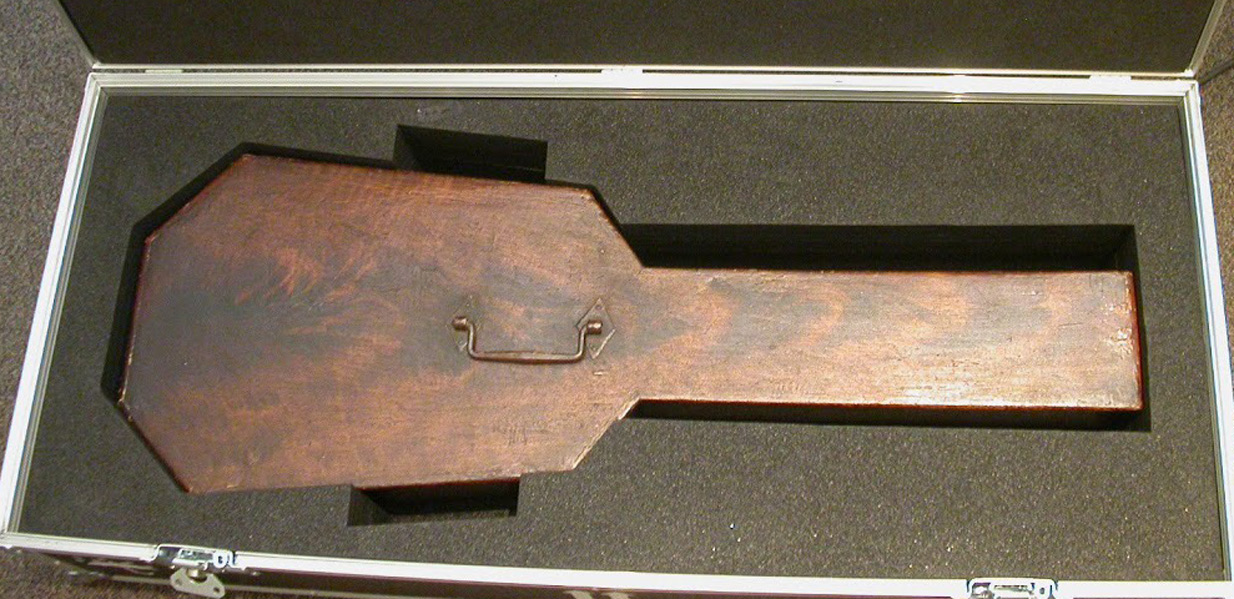Is This Creepy 19th-Century Guitar Cursed?

England's Bodleian Library—the main research library at the University of Oxford and one of the oldest libraries in Europe—is home to a rather unique guitar. The instrument, which is displayed alongside an eerie coffin-shaped guitar case, is linked to Frankenstein author Mary Shelley—not to mention a few centuries worth of speculation and controversy.
Mary's husband, English poet Percy Bysshe Shelley, who helped edit Frankenstein; or, The Modern Prometheus, Mary's popular gothic novel (published in 1818), drowned just a few weeks after presenting the guitar to his muse, Mary's good friend Jane Williams.

When Percy gave the guitar to Jane, it was accompanied by a lengthy poem in which he supposedly places his soul into the guitar, reserving its best tone for Jane and answering only to hands of perfect skill. Jane kept the guitar for her entire life and played it often.
But does the guitar really contain Percy’s soul? And is it just a coincidence that he died so soon after giving the guitar and poem to Jane?
To be honest, if I gave that guitar/poem combo to my wife’s best friend, I probably wouldn’t live too long either. Regardless, the guitar earned a reputation for being "cursed." Its creepy coffin-shaped case adds to the mystery, along with these lines from Percy’s poem to Jane: “And now, alas! the poor sprite is / Imprisoned for some fault of his / In a body like a grave."
You can hear Percy's complete poem below:
In 1816, Percy translated Johann Wolfgang von Goethe’s Faust into English (from German, of course). That's the 1808 play that's partially responsible for the tried-and-true “man sells his soul to the devil” cultural motif. Percy translated Faust while Mary was writing Frankenstein, a story that's almost identical to Faust, but from an atheist’s perspective.
Get The Pick Newsletter
All the latest guitar news, interviews, lessons, reviews, deals and more, direct to your inbox!
This also was the age of Niccolo Paganini, the world’s greatest violin virtuoso, who—legend has it—made a pact with the devil (um, just like Robert Johnson). Mary Shelley saw Paganini perform July 18, 1831, as her diary records: "I heard Paganini today—he is divine—he had the effect of giving me hysterics—yet I could pass my life listening to him—nothing was ever so sublime."
Whether or not Paganini met with Mary or Percy isn't clear, but they all would've been aware of each other, and it's easy to let your imagination run wild. Was the "deal with the devil" story just a clever marketing ploy by Paganini and a great basis for Mary and Percy to create what is considered the birth of science fiction? Perhaps when Percy and Mary were researching Faust, they stumbled upon a way to make a pact with the devil and paid the price.
OK, so, how does Jason Becker fit into all this?
Wikipedia lists Becker in the top spot under "Notable works inspired by compositions of Paganini." Becker's career was cut short by ALS (amyotrophic lateral sclerosis) right at the point of his big break. Fans have speculated that Becker—who studied Paganini's works—also "sold his soul" to play the way he did.
I started this research because I played on Jason’s behalf for the launch of his Carvin/Kiesel JB24 Numbers guitar and Seymour Duncan Perpetual Burn humbucker.
When I shared this tale with Jason, a dear friend of mine, this was his reply:
“Wow, this is all really interesting. Yeah, I have seen that I am listed as one of Paganini's 'disciples.' I remember before meeting Marty Friedman, and still for a while in Cacophony, I learned a bunch of Paganini's 24 Caprices. I really liked how he had mastered his craft. There was something I admired about how his playing made people feel in awe, or you know, gasp. I also heard it turned women on. I wanted to do that too. Ha ha! Really, though, I wanted to learn techniques from instruments other than guitar. It was mostly just fun.
"I should start telling people that I did sell my soul to the devil. It would be a much more interesting story than just a practicing kid. Plus, that would have been a ripoff deal, huh? Only a couple years of good 'devil level' of playing.”
So there it is—Jason says he just wanted to turn on women—no soul-selling involved! Of course, if he, I or anyone else had made a deal with the devil, we wouldn’t tell a soul.
Does that old guitar contain Percy's soul? I don’t know. Does it answer sweetly and flatter hands of perfect skill? They won’t let me play it to find out!
Special thanks to Dr. Bruce Barker-Benfield and Stephen Hebron, the leading authorities on Mary and Percy Shelley at the Bodleian Library Oxford. For more information, visit bodleian.ox.ac.uk.
“Among the most sought-after of all rhythm guitars… a power and projection unsurpassed by any other archtop”: Stromberg has made a long-awaited comeback, and we got our hands on its new Master 400 – a holy grail archtop with a price to match
The heaviest acoustic guitar ever made? Two budding builders craft an acoustic entirely from concrete because they “thought the idea was really funny”


![[from left] George Harrison with his Gretsch Country Gentleman, Norman Harris of Norman's Rare Guitars holds a gold-top Les Paul, John Fogerty with his legendary 1969 Rickenbacker](https://cdn.mos.cms.futurecdn.net/TuH3nuhn9etqjdn5sy4ntW.jpg)







